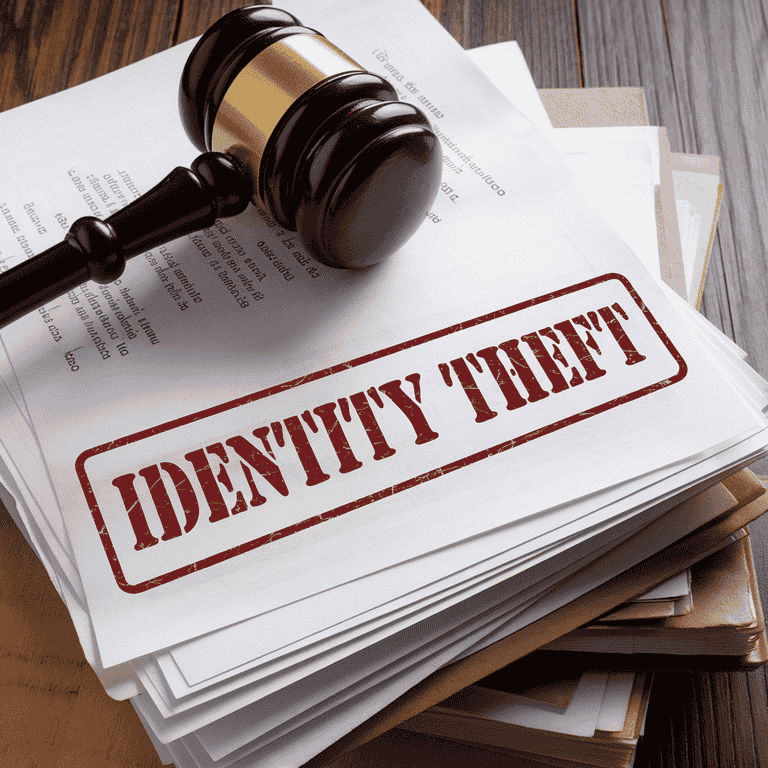Identity theft is a serious crime that can have devastating consequences for victims. But what happens when someone is caught committing this offense? Let’s dive into identity theft charges and explore what they mean for perpetrators and victims.
 What Constitutes Identity Theft
What Constitutes Identity Theft
Identity theft isn’t just about stealing someone’s credit card. It’s a complex crime with many facets. Let’s break it down.
Definition of Identity Theft
Identity theft occurs when someone obtains or possesses another person’s personal identifying information without consent. But it’s not just about having the information – the key is the intent to use it for fraudulent or unlawful purposes.
Imagine finding someone’s wallet on the street. If you pick it up intending to return it, that’s not identity theft. But if you’re thinking, “Hmm, I could use these credit cards,” now we’re in murky legal waters.
Types of Personal Identifying Information
You might be surprised at what counts as personal identifying information. It’s not just your name and birthday. Here’s a list of common types:
- Names and dates of birth
- Credit card numbers
- Social Security numbers
- Financial records
- Driver’s license numbers
- Passport numbers
- Biometric data (like fingerprints or retinal scans)
- Other identifying details (such as mother’s maiden name or childhood pet’s name)
Think about how much information you share online or carry in your wallet. It’s a sobering thought.

Federal Identity Theft Laws
When it comes to identity theft, Uncle Sam doesn’t mess around. There are severe federal laws in place to combat this crime.
Identity Theft and Assumption Deterrence Act
This act was a game-changer. It established identity theft as a federal crime in 1998. It is outlined in 18 U.S.C. § 1028.
Before this act, prosecutors had to charge identity thieves with related crimes like mail fraud or wire fraud. Now, identity theft itself is a distinct federal offense. It’s like the law finally caught up with the digital age.
Aggravated Identity Theft
If regular identity theft is terrible, aggravated identity theft is worse. It’s defined in 18 U.S.C. § 1028A and comes with enhanced penalties.
What makes it “aggravated”? It’s when someone uses stolen identity information to commit other felony crimes. Think of it as identity theft with a nasty twist.
For example, using a stolen identity to commit terrorism or immigration violations would fall under this category. It’s identity theft taken to a whole new level of seriousness.
State-Level Identity Theft Laws
While federal laws cast a wide net, states have their ways of tackling identity theft. Let’s examine how different states approach this crime.
Variations in State Definitions
Just like each state has its own flavor of barbecue sauce, each state has unique twists on identity theft laws. Some states cast a wider net than others regarding personal identifying information.
For example:
- California includes email addresses and online account information in its definition.
- Texas extends protection to biometric data like fingerprints and retinal scans.
- New York considers your mother’s maiden name as protected information.
It’s like a patchwork quilt of laws across the country. What’s illegal in one state might be a gray area in another.
Misdemeanor vs. Felony Charges
Here’s where things get interesting. The same act of identity theft could be a misdemeanor in one state and a felony in another. It’s like crossing state lines can suddenly make your crime more serious!
Factors that often determine the severity of the charge include:
- The amount of money involved
- The number of victims
- Whether it’s a first offense or a repeat crime

Penalties for Identity Theft
Now, let’s talk about the consequences. What happens when someone gets caught with their hand in the identity cookie jar?
Federal Penalties
Uncle Sam doesn’t take kindly to identity theft. Federal penalties can be harsh, a strong deterrent to would-be criminals.
- Prison sentences can range from 2 to 30 years. That’s a long time to think about your life choices!
- Fines can be hefty, sometimes reaching up to $250,000.
- In some cases, the court may order criminal forfeiture. This means saying goodbye to any property obtained through identity theft.
For aggravated identity theft, there’s a mandatory minimum sentence of 2 years on top of any punishment for the underlying felony. It’s like a criminal two-for-one deal, but not in the thief’s favor.
State Penalties
State penalties vary widely, but they’re generally nothing to sneeze at. Let’s break it down:
- Jail or prison terms can range from a few months for minor offenses to 20+ years for severe cases.
- Fines: These can be anywhere from a few hundred dollars to tens of thousands.
- Restitution: Many states require the thief to pay back what they stole. It’s like forced karma.
Some states have exciting twists. In Arizona, for instance, each use of stolen information can be charged as a separate felony. Talk about compounding problems!
Factors Affecting Sentencing
Judges don’t just pull sentences out of a hat. They consider several factors:
- Amount of financial loss to victims: The more significant the theft, the harsher the punishment.
- Number of victims affected: More victims often mean more time behind bars.
- Defendant’s criminal history: First-time offenders might get some leniency; repeat offenders… not so much.
- Vulnerability of victims: Targeting the elderly or disabled can lead to enhanced penalties.
- The sophistication of the scheme: A complex, well-planned operation might be judged more harshly than an opportunistic theft.
Remember, every case is unique. The specific combination of these factors can make a big difference in the final sentence.
Related Crimes and Charges
Identity theft often doesn’t act alone. It’s like the ringleader in a gang of related crimes. Let’s explore some of these accomplices.
Associated Federal Offenses
When identity theft is involved, other federal crimes often come into play. Here are a few that frequently join the party:
- Credit Card Fraud (18 U.S.C. § 1029) is a classic sidekick to identity theft. Using someone else’s credit card information without permission is a double whammy.
- Computer Fraud (18 U.S.C. § 1030): In today’s digital age, many identity theft cases involve hacking or unauthorized computer access. It’s like the cyber version of breaking.
- Mail and Wire Fraud (18 U.S.C. § 1341, § 1343): These charges arise when stolen identities are used to deceive through mail or electronic communications. Think of phishing scams or fake online sales.
These offenses can stack up, leading to even more severe penalties. It’s like building a criminal house of cards.
State-Level Associated Charges
States have their own set of charges that often accompany identity theft. Here are some common ones:
- Theft by Deception: This involves obtaining property or services through deceitful means, such as tricking someone into handing over their wallet.
- Fraud: A broad category that covers various deceptive practices intended to secure unfair gains. It’s the umbrella under which many identity theft cases fall.
- Misuse of Identification: This charge is specific to using another person’s identifying information for unlawful purposes. It’s the heart of identity theft.
These charges can vary by state, but they all share a common theme: deception and unlawful gain.

Legal Defense Strategies
Being charged with identity theft doesn’t automatically mean a conviction. Defense strategies can be employed, and they often hinge on the case’s specifics.
Challenging Evidence
One of the first lines of defense is questioning the evidence:
- Acquisition of Personal Information: How did law enforcement obtain the evidence? Was it through legal means? If not, it might be inadmissible in court.
- Intent to Defraud: Proving intent is crucial in identity theft cases. The defense might argue that there was no intent to use the information unlawfully.
- Mistaken Identity: Sometimes, the wrong person gets accused. A strong alibi or evidence showing a lack of involvement can be a game-changer.
These strategies require a keen eye for detail and a thorough understanding of the case specifics.
Negotiating Plea Deals
In some cases, negotiating a plea deal might be the best route:
- Reduced Charges: The defense might negotiate for lesser charges in exchange for a guilty plea. This could mean avoiding a felony conviction.
- Lighter Sentences: Especially for first-time offenders, agreeing to certain conditions might result in reduced sentences or alternative sentencing options like probation.
It’s all about finding a balance between accepting responsibility and minimizing consequences. A skilled attorney can make all the difference here, navigating complex legal waters to achieve the best possible outcome for their client.
Impact on Victims and Society
Identity theft isn’t just about numbers and laws. It’s about real people and real consequences. Let’s dive into the human side of this crime.
Consequences for Victims
Imagine waking up one day to find your life turned upside down. That’s often the reality for identity theft victims. Here’s what they might face:
- Financial Losses: This is often the most immediate and noticeable impact. Victims might find their bank accounts drained or credit cards maxed out.
- Credit Damage: A thief can wreak havoc on a victim’s credit score. This damage can take years to repair and affect everything from job prospects to housing applications.
- Time and Effort for Identity Restoration: Cleaning up the mess left by identity theft is like a full-time job. Victims often spend countless hours:
- Filing police reports
- Contacting creditors
- Disputing fraudulent charges
- Monitoring credit reports
- Emotional Toll: The stress and anxiety of having your identity stolen can be overwhelming. Some victims report feeling violated, vulnerable, and powerless.
- Legal Complications: In some cases, victims might be wrongly accused of crimes committed in their name. Clearing these up can be a nightmare.
Here’s a sobering statistic: On average, it takes victims about 200 hours and 6 months to recover from identity theft. That’s like working a full-time job for over a month to return to square one.

Broader Societal Effects
Identity theft doesn’t just hurt individuals. It sends ripples through our entire society:
Economic Impact on Businesses: Companies often bear the brunt of financial losses from identity theft. This can lead to:
- Higher prices for consumers
- Reduced profits and potential job losses
- Increased spending on security measures
Increased Security Measures: As identity theft becomes more prevalent, we all face:
- More stringent I.D. verification processes
- Longer wait times for financial transactions
- Reduced privacy as more personal information is required for everyday activities.
- Erosion of Trust: Identity theft can make people wary of online transactions and sharing personal information, slowing down economic growth and digital innovation.
- Strain on Law Enforcement: Investigating identity theft cases is complex and time-consuming, diverting resources from other areas of crime prevention.
- Insurance Costs: As identity theft claims rise, so do insurance premiums for everyone.
- To put this in perspective, the Federal Trade Commission reported that consumers lost more than $5.8 billion to fraud in 2021, a 70% increase from 2020. That’s a staggering amount of money that could have been used for more productive economic purposes.
Identity theft is like a silent epidemic. Its effects reach far beyond the immediate victims, touching all of us in ways we might not even realize. It’s a stark reminder of the importance of protecting our personal information and staying vigilant in our increasingly digital world.

Breaking It All Down
Identity theft is no small matter. It’s a complex crime with far-reaching consequences that touch lives in unexpected ways. Let’s take a moment to reflect on what we’ve learned.
We’ve seen that identity theft isn’t just about someone swiping your credit card. It’s a multifaceted crime that can involve:
- Stealing personal information
- Using that information for fraudulent purposes
- Causing financial and emotional havoc for victims
The legal system takes this crime seriously. From federal laws to state-specific regulations, there’s a web of legal consequences waiting for identity thieves. Penalties can range from fines to lengthy prison sentences, depending on the severity of the crime.
But here’s the thing: the impact of identity theft goes beyond just the legal realm. It’s personal. It’s emotional. For victims, it can feel like their whole world has been turned upside down. The road to recovery is often long and arduous.
And let’s remember the bigger picture. Identity theft doesn’t just affect individuals—it ripples through our entire society. It changes the way we do business, how we protect our information, and even how we trust one another.
So, what can we take away from all this?
- Stay vigilant: Protect your personal information like it’s the key to your kingdom – because, in many ways, it is.
- Be informed: Understanding the laws and consequences around identity theft can help you recognize and report it more effectively.
- Have empathy: If you know someone who’s been a victim of identity theft, remember that their struggle is real and often invisible.
- Support stronger protections: As our world becomes increasingly digital, we need robust laws and security measures to keep pace.
Identity theft may be a modern crime, but its impact is timeless. It strikes at the heart of who we are and how we interact with the world. By staying informed and vigilant, we can all help help combat this insidious crime.
Remember, in the digital age, your identity is one of your most valuable possessions. Guard it well.

Frequently Asked Questions
How long does it typically take to resolve an identity theft case?
The time to resolve an identity theft case can vary widely, from a few weeks to several years, depending on the complexity of the fraud and how quickly it’s discovered. On average, victims spend about 200 hours over 6-12 months to fully restore their identity.
Can identity theft affect my credit score?
Yes, identity theft can significantly impact your credit score. Fraudulent accounts, unpaid bills, and hard inquiries from unauthorized credit applications can lower your credit score. Acting quickly to minimize the damage and working with credit bureaus to remove fraudulent information is essential.
Are children at risk for identity theft?
Children can be prime targets for identity thieves because their credit histories are clean, and the theft may go undetected for years. Parents should monitor their children’s credit reports and be cautious about sharing their children’s personal information.
What should I do if my Social Security number is stolen?
Contact the Social Security Administration immediately if your Social Security number is stolen. Consider placing a security freeze on your credit reports and monitor them closely. You can also file an Identity Theft Report with the Federal Trade Commission.
Can I be held responsible for debts incurred by an identity thief?
Generally, you’re not responsible for debts incurred by an identity thief. However, you must prove that you didn’t authorize the charges. This often involves filing police reports, submitting an identity theft affidavit, and working with creditors to dispute the fraudulent charges.
How can I protect my identity when using social media?
To protect your identity on social media, use strong privacy settings, be cautious about what personal information you share, avoid accepting friend requests from strangers, and be wary of phishing attempts through messages or posts.
Is there insurance available for identity theft?
Yes, identity theft insurance is available. It typically covers expenses related to restoring your identity, such as legal fees, lost wages, and notary costs. However, it usually doesn’t cover direct financial losses from the theft.
What is synthetic identity theft?
Synthetic identity theft occurs when criminals combine real and fake information to create a new identity. This can be harder to detect than traditional identity theft because no single victim might notice and report the fraud.
How often should I check my credit report?
It’s recommended to check your credit report at least once a year. However, many effective suggest checking it more frequently, even monthly, to catch any suspicious activity early. Remember, you’re entitled to one free credit report from each of the three major credit bureaus annually.
What should I do if my passport is stolen?
If your passport is stolen, report it to the State Department immediately. You should also alert local law enforcement and consider placing a fraud alert on your credit reports, as a stolen passport can be used for various types of identity fraud.

Glossary
Aggravated Identity Theft: A more severe form of identity theft involves using stolen identity information to commit other felony crimes.
Biometric Data: Unique physical characteristics used for identification, such as fingerprints, facial features, or retinal patterns.
Credit Card Fraud: The unauthorized use of a credit card or credit card information to purchase or withdraw funds.
Criminal Forfeiture: The legal process by which a person convicted of a crime must give up property or assets obtained through illegal activities.
Felony: A severe crime typically punishable by imprisonment for more than one year or death.
Identity Theft and Assumption Deterrence Act: A federal law enacted in 1998 that established identity theft as a distinct federal crime.
Misdemeanor: A less severe crime typically punishable by a fine or imprisonment for less than one year.
Personal Identifying Information: Any data that can be used to identify a specific individual, such as name, Social Security number, or date of birth.
Phishing: A fraudulent attempt to obtain sensitive information by disguising oneself as a trustworthy entity in electronic communication.
Plea Deal: An agreement in a criminal case where the defendant pleads guilty to a lesser charge in exchange for a more lenient sentence or dismissal of other charges.
Restitution: Compensating the victim for loss, damage, or injury caused by the offender’s criminal actions.
Security Freeze: A tool that restricts access to an individual’s credit report, making it more difficult for identity thieves to open new accounts in the person’s name.
Synthetic Identity Theft: A type of fraud where criminals combine real and fake information to create a new, fictional identity.
Theft by Deception: Obtaining property or services through fraudulent or deceitful means.
Wire Fraud: A type of fraud that involves the use of telecommunications or the internet to carry out a scheme to defraud.

Additional Resources for You
During challenging legal situations, it’s paramount to have access to effective guidance and comprehensive information. Our lead attorney, Molly Rosenblum, Esq., has a profound commitment to assisting individuals through intricate legal matters. With an extensive range of meticulously curated resources, she provides in-depth knowledge and strategic insights across various aspects of criminal defense law. Here’s a summary of the valuable resources crafted by Molly Rosenblum, Esq., designed to support you in your time of need:
Theft Crime Defense Lawyer: A specialized resource for those seeking legal defense in cases of theft, offering insights and strategies. Explore the guide.
White Collar Crime: Navigate the complex landscape of white-collar crime with detailed information and legal perspectives. Learn more.
Racketeering Charges: Understand the intricacies of racketeering charges and the legal frameworks surrounding them. Discover key information.
Fraud Charges: Gain insights into the legal ramifications and defense strategies related to fraud charges. Read in-depth.
Embezzlement Charges: Explore the specific legal considerations and defense approaches for embezzlement charges. Find out more.
Identity Theft Charges: Delve into the complexities of identity theft charges and how to navigate these legal challenges. Get informed.
Larceny Charges: Understand the nuances and legal strategies pertaining to larceny charges. Learn the specifics.
Credit Card Fraud Charges: Access detailed information on the legal landscape and defense tactics for credit card fraud. Explore your options.
Burglary Charges: Get to know the legal implications and defense strategies related to burglary charges. Read more.
Robbery Charges: Familiarize yourself with the specific challenges and defense approaches for robbery charges. Understand your rights.
Grand Theft Charges: Grasp the intricacies of grand theft charges and the potential legal pathways. Learn in-depth.
Molly Rosenblum, Esq. ensures that these resources are not just informative, but also actionable, providing you with the clarity and support needed to navigate your legal journey. Each resource is tailored to address specific legal concerns, empowering you to make informed decisions during critical times.

Offsite Resources for You
Here are some additional offsite resources that might be useful for further learning:
Federal Trade Commission: Identity Theft: This resource provides comprehensive information on how to handle identity theft, including steps to recover.
Legal Information Institute: Theft: This page from Cornell University’s Legal Information Institute offers a comprehensive overview of theft law.
Nevada Revised Statutes: Crimes Against Property: This section of Nevada’s laws covers theft, burglary, and other crimes against property.
American Bar Association: Criminal Justice Section: The ABA’s Criminal Justice Section provides resources on a range of criminal justice topics.
National Legal Aid & Defender Association: This organization provides legal assistance to those who cannot afford it, and their website includes a variety of resources on criminal defense and other legal matters.
National Association of Criminal Defense Lawyers: This professional organization for criminal defense lawyers offers resources on a variety of legal topics, including theft and other crimes.
Bureau of Justice Statistics: This federal agency provides statistics on crime, criminal offenders, victims of crime, and the operation of justice systems at all levels of government.
Why You Haven't Already Hired a Defense Attorney to Help You
Watch this short video to take the next big step toward defending your rights against your felony charge.

A Special Message from Our Lead Attorney

Dear Reader,
I’m Molly Rosenblum, Esq. and I wanted to thank you for taking the time to read through our resources on identity theft charges. I understand that dealing with such circumstances can be overwhelming and confusing, so I’m committed to providing clear, accessible information to help you navigate this challenging time.
Remember, you don’t have to face these challenges alone. I invite you to schedule a free consultation to discuss your circumstances and how I can assist you. Please feel free to call at (702) 433-2889.
I look forward to providing you with the legal support you need.
Best regards,
Molly Rosenblum, Esq.



